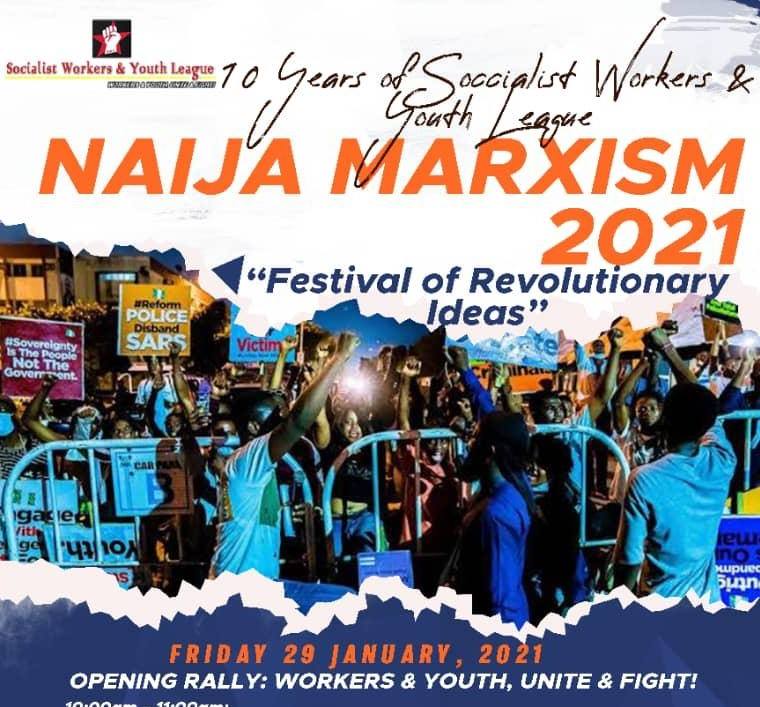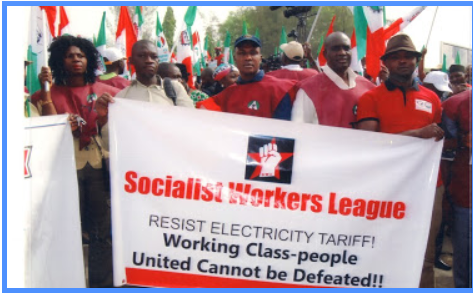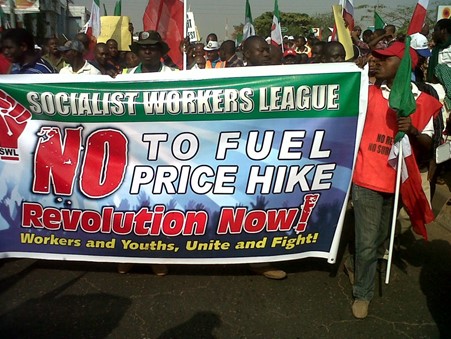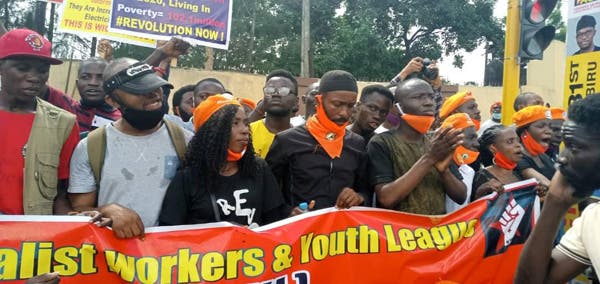The Socialist Workers & Youth League commemorated its 10th year anniversary with an online “Naija Marxism – Festival of Revolutionary Ideas”. The festival was a one-day educational programme with a series of panels where leading activists from different organisations made presentations on current issues of concern to working-class people which were heartily discussed.
The first panel dwelt on the question “revolution or restructuring; how do we win system change?”. The presenters were Achike Chude, deputy chairperson of the Joint Action Front (JAF); Lai Brown, national secretary of the SWL; and Professor Omotoye Olorode, a leading member of the Socialist Congress of Nigeria (SCON).
Restructuring as is usually propounded by politicians and in the mainstream media was considered by most of the speakers as a deceptive agenda. Different sections of the ruling class use this agenda of the bosses to mobilise working-class people from “their” ethnic groups behind them, in their intra-class competition for greater access to state resources.
The aim of workers, poor farmers and oppressed people across ethnic, regional, and national lines must be to overthrow these exploiters and their capitalist system. We need to emancipate ourselves from their oppressive clutches and build socialist society based on solidarity, democracy from below and social justice.
The second panel looked at “EndSARS, police brutality and struggle” with a view to drawing lessons from the recent anti-police brutality rebellion. The lead speakers were Dabiri Ayuku who was a mobiliser at the Lekki tollgate during the EndSARS protests; Juwon Sanyaolu, campus coordinator of the Take It Back movement; and Gbenga Komolafe, who is general secretary of the Federation of Informal Workers’ Organisations of Nigeria (FIWON) and a co-convener of the Coalition for Revolution (CORE).
In the course of discussion, speakers pointed out that the police’s main purpose is to defend of the oppressor class and the capitalist system. That is why they are more efficient in reacting to protests than in combating crime. But the power of coercion which they exercise for the oppressors is whittled as the political power of the regime they serve is smashed when a mass rebellion grows into a revolution.
The EndSARS protests was a movement of rebellion. It was growing too powerful for the liking of the ruling class. They acted by drowning the movement in blood to stop this revolt from blossoming into a revolution.
There are important lessons for us to learn from this historic movement. There is no easy road to revolution as the speakers pointed out. Speakers highlighted two points of note for activists waging revolutionary struggle.
First, is the structural power of the working-class. Protests are very important, and the masses have to reclaim the streets to make revolution. But the social force with the power to decisively bring the exploiters to their knees is the working-class. Protests have to be combined with mass strikes which hit the bosses where it hurts most – the process of production which is where they generate the profits that they feed fat on.
Speakers noted the role of trade union leaders in holding back this power of the working-class most times, except it becomes impossible for them to do so due to mass pressure of rank-and-file workers. A good example of such pressures from below forcing them to call a general strike which helped generalise a popular rebellion was in January 2012, when the trade unions had to call a general strike to demand reversal of the hike in fuel pump price.
This was after working-class people had taken to the streets and workers in the factories and other workplaces were loud in calling for trade union action from their leaders. But they eventually called off that strike when they saw that the uprising was turning into a pre-revolutionary situation.
Speakers recalled that the unions had called a strike for 28th September to demand reversal of, yet another fuel pump price hike accompanied by a sharp increase in electricity tariff. But they called this strike off at the last minute.
 This was just over a week before the nationwide EndSARS protests began. And the reason why they did so was made clear by some of these union leaders in a series of interviews. It was to avoid the unfolding of a revolutionary situation!
This was just over a week before the nationwide EndSARS protests began. And the reason why they did so was made clear by some of these union leaders in a series of interviews. It was to avoid the unfolding of a revolutionary situation!
So, a major lesson for revolutionary activists is to work with workers at the local and state levels of the trade union movement, to be able to deepen their pressures on the national bodies of the trade union movement as well as to support the workers’ struggles at these grassroots levels.
The second major lesson is the limited role of the revolutionary left movement in the EndSARS movement and the need to strengthen the spread and influence of socialist ideas and organisation in the struggle. This, they all pointed out, is crucial for working-class people and youth to win total liberation and build a better society.
Speakers pointed out the contribution of earlier mass mobilisation by the Coalition for Revolution (CORE) to the rebellious atmosphere in which the EndSARS movement emerged. From 5th August 2019 when CORE launched its RevolutionNow campaign till 1st October when it organised a nationwide protest, it had consistently shown that a stand could be taken against the regime on the streets.
And when the EndSARS protest began, it was the only force from the revolutionary left that was on the ground. But the influence of revolutionary socialist ideas on the protests were minimal. While the rebellion has been described as “leaderless”, the ideologically and politically dominant forces of the movement, particularly in its first week, were liberal.
This dominance was challenged by CORE activists, some of whom were attacked verbally and physically with copies of the CORE Charter for Total Liberation torn by some of the supporters of these liberal ideas.
By the second week, CORE activists had won huge support around ideas and slogans which they had argued for from the beginning such as “No to Bad Governance” and “Buhari Must Go”. These helped to show the linkages between police brutality, governance, the regime, and the systemic nature of oppression.
A more concerted involvement of the revolutionary left in the protests would have however helped to deepen the radicalisation of the tens of thousands of people entering struggle for the first time on the streets, quicker and more broadly.
Part of the reasons why this was not the case is that revolutionary socialist groups in the country are few and have few members. They also generally have little or no political influence in the ranks of working-class people and youth.
But a related problem is sectarianism. Most of these small groups see themselves already as the party or “movement” in waiting to provide leadership for the impending Nigerian revolution, despite their clear objective limitations.
SWL and CORE had called for a principled unity of the revolutionary left and the overcoming of this sectarian approach to socialist politics before the protests. Concretely, this would entail an alliance between the different coalitions of revolutionary groups. No positive response was forthcoming. We will keep on pursuing this goal. Achieving it will help to better position the revolutionary left to provide leadership in subsequent mass rebellions.
The third panel considered what a Marxist Response to the COVID-19 pandemic should be, to put people before profit and health before wealth. The panellists were Dr Jayeola Kajero, a fellow of the West African College of Physicians; Dr Goke Akinrogunde, a leading member of the Campaign for Workers Alternative (CWA); and Baba Aye, a trade union health policy expert and editor of Socialist Worker.
Speakers observed that the pandemic pointed a torchlight on the indefensible levels of social and economic inequality within and between countries and further deepened these. The for-profit logic of capitalist development is at the heart of these inequalities.
The major reason for the deadly impact of the pandemic is that capitalist production is based primarily on the drive for capitalists to make profit. Meeting the health and other social needs of people is at best secondary. That is why there was a shortage of personal protective equipment at the beginning of the pandemic.
As a second wave of the pandemic commenced and vaccines were developed, this putting of profit before the lives of people and the bosses’ wealth before the health of the masses become manifest once again. Big pharmaceutical companies have patented vaccines they developed despite the fact that they received up to $113bn of tax-payers money for the research.
With such copyright, they stand to make billions of dollars in profits while billions of people, particularly in the poorer underdeveloped countries will not be able to access the vaccines because of their high costs.
As one of the speakers pointed out, while 39million doses of the vaccine had been administered in 49 advanced capitalist countries by mid-January, Guinea was the only country that had been able to administer the vaccine in Africa and the poorer countries in general. And this was just 25 doses!
This terrible situation will not change without struggle. And indeed, workers – particularly the frontline health workers – have been fighting. The wave of strikes in the health sector last year is testimony to this. There is however a great need for concerted efforts which directly challenge the priority of profit-making, at the heart of capitalism.
For example, as a speaker pointed out, working-class people across the world need to unite around the mobilisation for a #PeoplesVaccine. This essentially is a demand for vaccines to be made available to everybody everywhere and at no cost whatsoever. The people’s health must come first before the capitalists’ wealth. We must thus stand for the withdrawal of patent rights on all COVID-19 vaccines, medical devices, and technologies.

As interesting as the panel discussions were, Naija Marxism was also about the lived struggles of workers and youth, as well as about the history of the Socialist Workers & Youth League. There were two rallies where trade unionists and student activists on the frontlines of struggles spoke of their experiences and there was also a discussion on the ten-year history of the SWL.
The struggle of members of the Senior Staff Association of Nigerian Polytechnics (SSANIP) at the Lagos state polytechnic (LASPOTECH) was recalled by Folorunso Odunuga, one of the leaders of the union. SSANIP members have been on the barricades for the past two years demanding the proper placement on the salary structure. They organised a mass strike to push home their demands.
The response of the school management and state government was to draft in the police to break this strike. Folorunso and several of her colleagues were arrested and detained at Panti police station. She informed participants that she was with her granddaughter, a toddler at the time, and the little child was equally locked up.
She also expressed the appreciation of SSANIP members for left groups like the SWL who stood with them through the struggle. Thanks to this fightback, the state government is now looking into the matter more seriously after the setting up of a visitation panel.
Michael Ifemosu of the federal university of agriculture Abeokuta (FUNAAB) also recounted his ordeals as a student activist. He was expelled in 2019 for writing an open letter to the university’s vice-chancellor where he spoke about the university’s shabby transportation system.
This was having adverse impact on the students’ academic performance by making them late for classes. He also highlighted how the police persistently harassed students in the letter. He had subsequently been hounded by the police and other security services personnel. And the university authorities have continually maligned him in the media.
Michael expressed his appreciation of solidarity from the revolutionary movement through his travails and called for continued political solidarity. SWL assured him of our unabated solidarity for him and all other activists facing victimisation in different ways on campuses.
The SWL Chair, comrade Frances Akinjole and editor of the Socialist Worker, comrade Baba Aye gave an historical background of the origins and development of SWL. The League was formed on 29th of January 2011 with the merger of Socialist Workers Movement (SWM) and Socialist League (SL), after a process which was formally initiated on 6th March 2009 by the SWM.
SWM had been formed as the May 31st Movement (M31M) in 1990 and adopted International Socialist politics the following year. SL emerged in the early 2000s with the exit of a few comrades from the Democratic Socialist Movement. Efforts were made, first to stop the merger and then to sabotage it by a few leading members of SWM who had gradually fallen out of the organisational life of the group for years.
But the merger went on, laying the basis for SWL as a virile revolutionary body of International Socialists. Unfortunately, nine years later, a handful of members from the old SL left the organisation without any political debate on principles, and to join our former co-travellers from the old SWM who tried to sabotage the formation of the SWL in the first place. This has however not hampered the growth and development of the League which has seen a rise in membership and branches since then.

In the course of the last ten years, SWL has been actively involved in all major struggles of working-class people and youth in the country. From the 2012 January Uprising to the 2020 EndSARS revolt, SWL has been the revolutionary socialist group on the frontlines. With our perspective of the importance of unity in struggle, we have been a committed organisation in all the major coalitions of radical and revolutionary groups. And with members active in the trade union movement, we have been at the fore of carrying out political education within the trade unions.
SWL was born in the midst of a world in turmoil, in the wake of the 2007-2009 Great Recession. Our founding convention was held as revolutions swept across the Middle East and North Africa. Today, the systemic crisis of capitalism has gone from bad to terribly worse.
The living conditions of poor people has worsened, while the wealth of a handful of super-rich people has exploded. The COVID-19 crisis has put the irredeemable character of this exploitative system in bold relief. The climate emergency is taking the world to the precipice of extinction, and social inequalities have reached astronomical heights.
Now more than ever the need for socialist revolution cannot be overemphasized, for humankind and the earth to avoid catastrophe. In the hands of working-class people lies the power to bring to birth a new socialist world on the ashes of capitalism. Revolutionary socialists have the tasks of enrichening the class consciousness and encouraging the independent organisation of workers, poor farmers, youth, and all oppressed people, for revolutionary struggle. SWL and its members dedicate themselves to contributing significantly to this historic task, join us now
by Todun JAGUN









